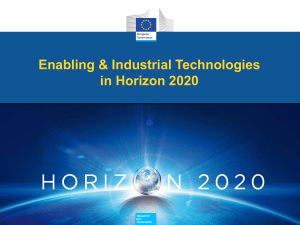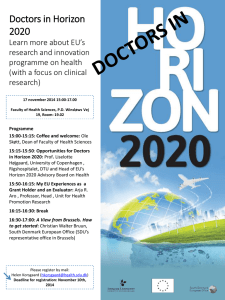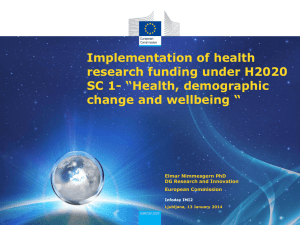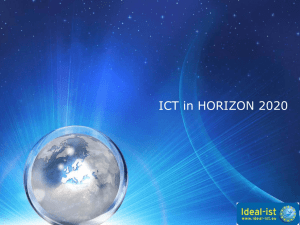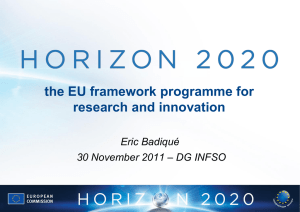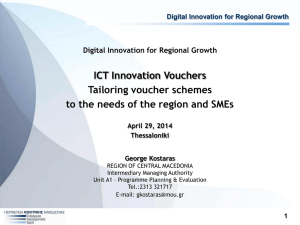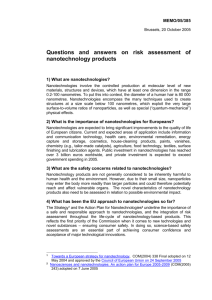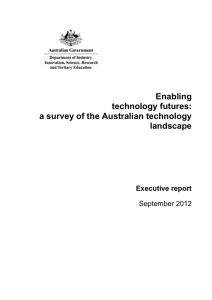Industrial leadership The Industrial leadership objective aims at
advertisement
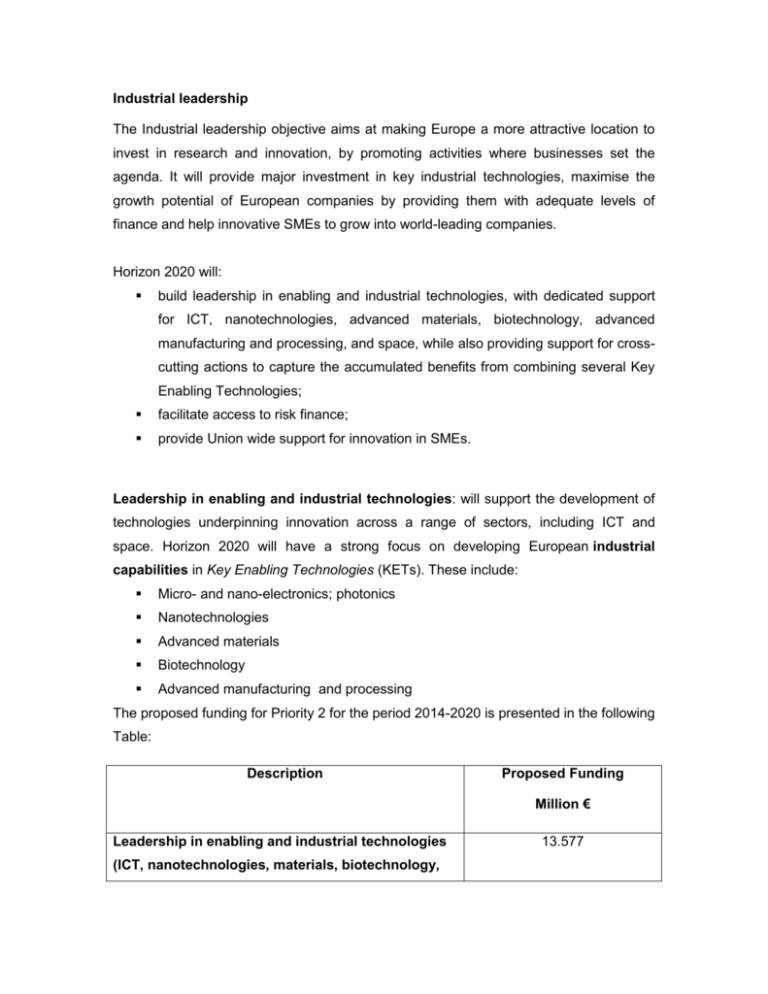
Industrial leadership The Industrial leadership objective aims at making Europe a more attractive location to invest in research and innovation, by promoting activities where businesses set the agenda. It will provide major investment in key industrial technologies, maximise the growth potential of European companies by providing them with adequate levels of finance and help innovative SMEs to grow into world-leading companies. Horizon 2020 will: build leadership in enabling and industrial technologies, with dedicated support for ICT, nanotechnologies, advanced materials, biotechnology, advanced manufacturing and processing, and space, while also providing support for crosscutting actions to capture the accumulated benefits from combining several Key Enabling Technologies; facilitate access to risk finance; provide Union wide support for innovation in SMEs. Leadership in enabling and industrial technologies: will support the development of technologies underpinning innovation across a range of sectors, including ICT and space. Horizon 2020 will have a strong focus on developing European industrial capabilities in Key Enabling Technologies (KETs). These include: Micro- and nano-electronics; photonics Nanotechnologies Advanced materials Biotechnology Advanced manufacturing and processing The proposed funding for Priority 2 for the period 2014-2020 is presented in the following Table: Description Proposed Funding Million € Leadership in enabling and industrial technologies (ICT, nanotechnologies, materials, biotechnology, 13.577 manufacturing, space) Access to Risk Finance 2.842 Leveraging private finance and venture capital for research and innovation Innovation in SMEs 616 + Fostering all forms of innovation in all types of SMEs Leadership in Enabling and Industrial Technologies (LEITs) Information and Communication Technologies Information and Communication Technologies (ICT) brings unique responses to society's challenges such as the growing needs for sustainable healthcare and ageing well, for better security and privacy, for a lower carbon economy and for intelligent transport. The overall aim of EU research and innovation in Information and Communication Technologies (ICTs) under Horizon 2020 is to bring the benefits of progress in these technologies to European citizens and businesses. This EU investment will support the ICT research and innovation that can best deliver new business breakthroughs, often on the basis of emerging technologies. In particular, ICT in Horizon 2020 will support the development of ICT in Science, industrial leadership and societal challenges. For more information regarding the funding of Information and Communication Technologies in the framework of the Work Programmes for 2014-2015 in Horizon 2020, interested parties may refer to the “Guide to ICT-related activities in WP2014-2015”. Nanotechnologies, Advanced materials, Advanced Manufacturing and Processing, Biotechnology The Program is constituted by the following five Calls: (a) “Nanotechnology, Advanced Materials and Advanced Manufacturing Processes”, that covers topics from the respective scientific fields of nanotechnology, materials science and industrial production, (b) “Biotechnology”, which includes cutting edge issues and future applications of biotechnology in all sectors of the economy, (c) "Factories of the Future - FoF", which aims to strengthen the European industry, (d) "Energy efficient Buildings EeF", which covers research and technologies in the construction industry, and (e) "Sustainable Industrial Processes - SPIRE", which includes a number of important research areas such as energy applications, industrial pollutants, etc. Space The “Space” Programme, under the “Industrial Leadership” Priority, has the main objective to foster a cost-effective competitive and innovative space industry (including SMEs) and research community to develop and exploit space infrastructure to meet future Union policy and societal needs. A special aim is for the European space research community to develop innovative space technologies and operational concepts "from idea to demonstration in space", and to use space data for scientific, public, or commercial purposes. Within this context, the “Space” Programme has been structures to address the abovementioned challenges by: Prioritising the existing two EU Space flagships of European Global Navigation Satellite System (EGNSS) and Earth Observation reaping the benefits they can generate in the coming years and ensuring their state-of-the-art also in the future; Ensuring the protection of space infrastructure and in particular the setting up of a Space Surveillance and Tracking system (SST) at European level; Ensuring support to EU industry to meet the objectives defined in the Commission communication on Space Industrial Policy, notably to maintain and enhance industry’s competitiveness and its value-chain in the global market; Ensuring that Europe’s investments made in space infrastructure are exploited to the benefit of citizens; as well as supporting European space science; Enhancing Europe’s standing as attractive partner for international partnerships in space science and exploration. Access to Risk Finance Innovation in SMEs
